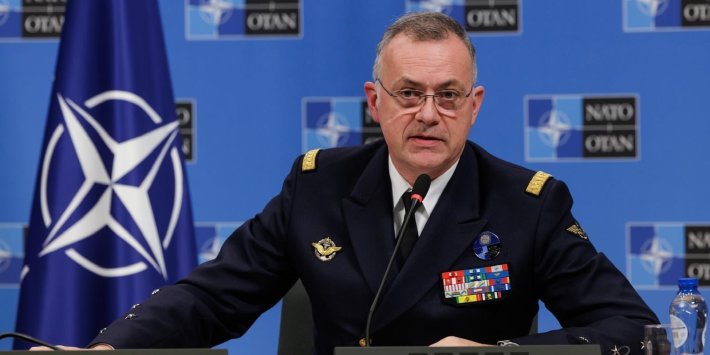
Admiral Pierre Vandier
9 min read
With European security standing on a knife-edge, Nato Commander Admiral Pierre Vandier tells Sophie Church the UK can lead Nato’s intelligence and surveillance operations
“You see in this world there’s two kinds of people, my friend. Those with loaded guns and those who dig. You dig.”
It’s not the quote one might expect from a French Admiral, but it’s the one Pierre Vandier, Nato Commander, chooses to illustrate the choice facing the West in the face of Russian aggression. In The Good, the Bad and the Ugly, Clint Eastwood was standing, loaded gun in hand, forcing a bandit to dig into a grave. Vandier, in full uniform, similarly knows which “kind of people” he wants to be.
The House has joined the Nato Commander in Paris, at a restaurant in the shadows of France’s Ministry of Armed Forces. It’s a balmy summer’s day, but storm clouds are brewing.
After decades of peace on the continent, European countries are racing to rearm against Russia. Israel’s recent attack on Iran and the potential of a Chinese attack on Taiwan threaten to preclude the US from assisting Europe in a war that now seems inevitable. The future of Nato, in the face of this, is uncertain.
It’s a race, and so each minute, each week, each month, each year counts
As Supreme Allied Commander Transformation, Vandier, 57, has an unenviable task: to ensure Nato has the right equipment and personnel to respond to ever-mercurial threats. He is one of just two commanders – the other, Supreme Allied Commander Europe Christopher Gerard Cavoli – tasked with setting Nato’s strategy.
Today, Vandier tells The House the UK can lead Nato’s intelligence and surveillance functions in the face of a future attack.
“The US may lack satellite people, analysts and brain time if they are focused on China, if something happens, and not be able to help the Europeans to build their Joint Prioritised Target List [targets in a military operation],” he says.
“I think the UK has this in its DNA and so may be useful to build this new generation of C4ISR [systems predicting attacks on the ground, sea, air and in space through intelligence and surveillance] in Nato.”
While Vandier will not comment on where Labour’s Strategic Defence Review (SDR) was lacking, he thinks the publication is “really smart”: “I think this is probably one of the first times where we see such a good understanding of how war fighting moves.”
“The intellectual contribution of the SDR is something that fits the thinking in Nato,” he adds.
With the Nato Summit underway, the UK, along with other member states, are now facing pressure to reach five per cent of spending on defence – the figure President Trump has demanded as a guarantee for continued US security protection.
Will we see an attack from Vladimir Putin before countries can reach that target?
“We need to consider that is possible,” Vandier says. “This possibility brings a sense of urgency amongst the allies. We can’t say it will not happen.”
“I’m not able to say what will go on in the future. But I definitely can say it’s a race, and so each minute, each week, each month, each year counts,” he adds.
This is a time of “hybrid peace”, says Vandier, where Russia is constantly testing our defences: flying drones and fighter jets over Nato territory, and launching near-constant cyber-attacks on European institutions. “The aim, I think, is to consume all our energy in purely defensive actions, which are very costly.”

When an attack on Nato territory does come, the Commander believes Russia will be acting on chance, not premeditation. “A frontal attack on Nato is something which is not very credible,” he says. “I see much more an opportunistic attack. I see weakening some allies, trying to exploit cracks and undermine any will.”
For Vandier, committing to five per cent defence spending to combat such an attack will “not be the core of the debate” at the Nato Summit, taking place in The Hague on 24 to 25 June. Instead, countries will be deciding how quickly to rearm.
To have a chance of winning the “race”, member states will need to reform their decades-old procurement models – where countries give defence companies a shopping list of equipment that they then produce, says Vandier. He points to new technologies such as drones – designed, then redesigned, to respond to evolving threats – as an alternative.
“You can invent the weapons of your user’s case,” he says, explaining that equipment can be repeatedly modified to fit the changing needs of armed forces. “You think about a way to do the war, and three months later you have the tool to wage it.”
Do Nato states need to completely change the way they procure equipment?
“Yes, definitely,” Vandier replies. “It’s a big question in the US, and I think once the US changes, you will see momentum in Europe. There are big discussions in the US about refining the procurement system, which is not fitting for that kind of high-speed development path.”
“The speed of design and use-adaptation is something which may be four times quicker than the old system,” he adds.
Relying on the automotive and naval manufacturing industries for support with weapon manufacturing will also be important, says Vandier. “We see now a lot of discussion between, for example, the car industry and the military industry to do something that was done a century ago – using industrial capacity, which is not military, in support of the military.”
Vandier, who frequently discusses this strategy with defence ministers from across the 32 Nato nations, is aware of ongoing conversations between ministers and car manufacturers.
Renault has been approached by the French government to manufacture drones in France, and Volkswagen and Mercedes are considering the same in Germany. The House understands British ministers are not currently holding the same conversations but there is interest within government in having such contingency plans.
Vandier also supports abolishing Environmental, Social and Governance (ESG) commitments, which have seen Europe’s financial institutions shy away from supporting the defence industry.
We slept thinking that we were at peace forever, that growth was eternal, that we solve all the problems by talking
“These rules were really to ban military investment: ‘don’t finance bombs’. All the hedge funds in Europe were deterred from investing into defence. We need to change that; defence is a part of our future.”
Raising the capital to finance our rearmament is one thing; deciding how to spend it another. For the Commander, Europe should consider financing a non-nuclear deterrent.
“We invest too poorly in non-nuclear deterrence,” he says. “It’s not a competition between nuclear and non-nuclear; it’s just giving support to both. We’ve realised you can’t have a credible nuclear deterrence without a conventional tool.”
Taking a pen and paper, he sketches a globe and two rings – one close to the earth’s surface, and one further away. Where French and British nuclear deterrents may prevent a nuclear conflict on an astronomic scale – the ring furthest away – Europe lacks a deterrent for the use of ballistic missiles closer to the ground.
“20 years ago, ballistic missiles would be fired by someone at a 3,000-kilometer range, and everybody would have understood that we are close to the nuclear threshold. Now it happens every day: from the Houthis, Iranians and North Koreans,” he says. “The language is blurred below the nuclear threshold. That is why we need to consider the question of anti-ballistic missile protection.”
Would he support an Iron Dome for the UK?
The Commander’s role means he cannot answer political questions, but he suggests the endeavour would be too costly.
“This is a big lesson of the Cold War that the Russians learned: the price for defence is exhausting; and they were consumed by protecting themselves against this threat. That means that the money we have needs to achieve a good balance between offence and defence. We can’t put all the money in defence.”
However, Vandier says biological warfare is a threat for which all western countries are completely unprepared.

Last month, for example, the FBI arrested a Chinese national for smuggling a dangerous biological pathogen into the US. Allegedly, Yunqing Jian carried ‘fusarium graminearum’ into the country – a fungus that can decimate crops and cause serious health issues for humans.
“We are not ready. We are ready for terrorist attacks and for limited attacks. For biological attacks – none of the western countries are ready,” he says. “With biowarfare, you would have maybe thousands of cruise or ballistic missiles arriving with chemical warheads. We are not ready for that.”
Space has become an increasingly important arena for responding to enemy attacks. While European countries are trying to bolster their sovereign space assets, Vandier is reluctant to say any one country should coordinate joint efforts in space: “France, Italy and Germany are ramping up, and Britain, Norway and Sweden. None of them are able to take the lead alone.”
However, satellite-group Eutelstat OneWeb, seen as Europe’s answer to Elon Musk’s Starlink, has recently fallen into financial difficulty. According to Bloomberg, OneWeb needs at least €1.5bn at a minimum to remain operational. Its total market capitalisation – the total value of its shares on the stock market – is around €1.2bn.
Is Vandier concerned?
“It’s a difficult path for the financial support of OneWeb, because the commercial pillar, I think, is a little bit weak,” he says. “Financial support is undermined by this lack of a commercial perspective.”
To combat over-reliance on one satellite provider, he would like to see more start-ups competing in Europe. “I’m more than happy if I can see some competition in this domain, where we see a struggle between the companies to try to do better for lower prices,” he says. “I think it will be more bang for the buck for the Europeans.”
In between considering how war will be waged – through ballistics, nuclear or biological warfare – Vandier is also looking at where conflicts could arise. Onto his office wall, he has recently stuck a map of the Arctic Ocean – an ominous reminder of the near-universal threat Nato countries now face.
“Global warming makes possible the shift of forces from the Pacific to the Atlantic and so to confrontation in the Great North,” he says. “So, you see discussion about Greenland, about the Great North, the White Sea, and the militarisation by Russia of this.”
Europe is in a race against time, Vandier reiterates, where “adventurism” from our enemies – favouring fighting over talking – has taken us completely by surprise.
“We slept thinking that we were at peace forever, that growth was eternal, that we solve all the problems by talking,” he says. “Now we need to demonstrate that we are smart, we are working, and we are putting resources into protecting ourselves and future generations.”





